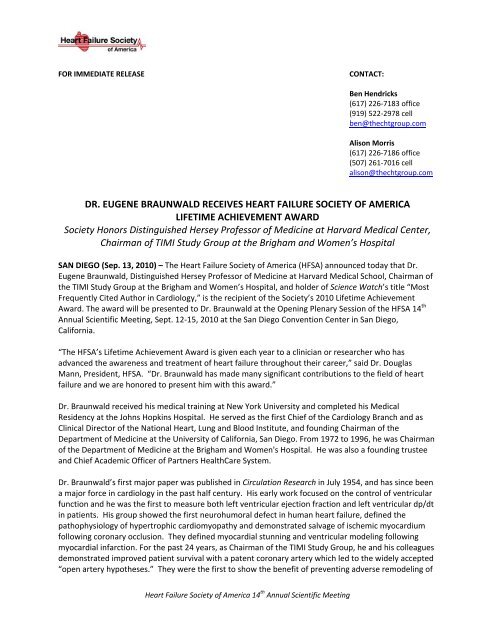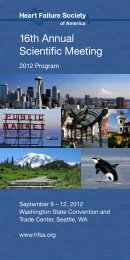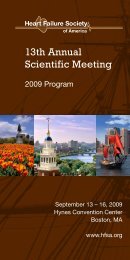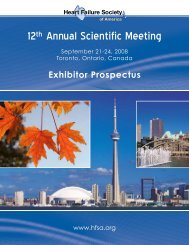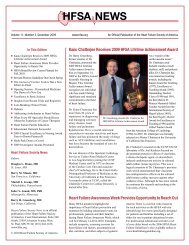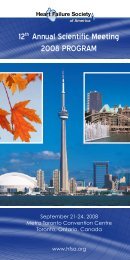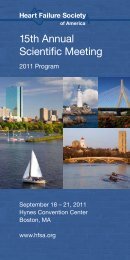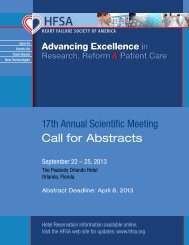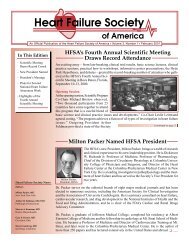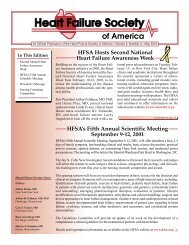DR. EUGENE BRAUNWALD RECEIVES HEART FAILURE ...
DR. EUGENE BRAUNWALD RECEIVES HEART FAILURE ...
DR. EUGENE BRAUNWALD RECEIVES HEART FAILURE ...
You also want an ePaper? Increase the reach of your titles
YUMPU automatically turns print PDFs into web optimized ePapers that Google loves.
FOR IMMEDIATE RELEASE<br />
CONTACT:<br />
Ben Hendricks<br />
(617) 226‐7183 office<br />
(919) 522‐2978 cell<br />
ben@thechtgroup.com<br />
Alison Morris<br />
(617) 226‐7186 office<br />
(507) 261‐7016 cell<br />
alison@thechtgroup.com<br />
<strong>DR</strong>. <strong>EUGENE</strong> <strong>BRAUNWALD</strong> <strong>RECEIVES</strong> <strong>HEART</strong> <strong>FAILURE</strong> SOCIETY OF AMERICA<br />
LIFETIME ACHIEVEMENT AWARD<br />
Society Honors Distinguished Hersey Professor of Medicine at Harvard Medical Center,<br />
Chairman of TIMI Study Group at the Brigham and Women’s Hospital<br />
SAN DIEGO (Sep. 13, 2010) – The Heart Failure Society of America (HFSA) announced today that Dr.<br />
Eugene Braunwald, Distinguished Hersey Professor of Medicine at Harvard Medical School, Chairman of<br />
the TIMI Study Group at the Brigham and Women’s Hospital, and holder of Science Watch’s title “Most<br />
Frequently Cited Author in Cardiology,” is the recipient of the Society’s 2010 Lifetime Achievement<br />
Award. The award will be presented to Dr. Braunwald at the Opening Plenary Session of the HFSA 14 th<br />
Annual Scientific Meeting, Sept. 12‐15, 2010 at the San Diego Convention Center in San Diego,<br />
California.<br />
“The HFSA’s Lifetime Achievement Award is given each year to a clinician or researcher who has<br />
advanced the awareness and treatment of heart failure throughout their career,” said Dr. Douglas<br />
Mann, President, HFSA. “Dr. Braunwald has made many significant contributions to the field of heart<br />
failure and we are honored to present him with this award.”<br />
Dr. Braunwald received his medical training at New York University and completed his Medical<br />
Residency at the Johns Hopkins Hospital. He served as the first Chief of the Cardiology Branch and as<br />
Clinical Director of the National Heart, Lung and Blood Institute, and founding Chairman of the<br />
Department of Medicine at the University of California, San Diego. From 1972 to 1996, he was Chairman<br />
of the Department of Medicine at the Brigham and Women's Hospital. He was also a founding trustee<br />
and Chief Academic Officer of Partners HealthCare System.<br />
Dr. Braunwald’s first major paper was published in Circulation Research in July 1954, and has since been<br />
a major force in cardiology in the past half century. His early work focused on the control of ventricular<br />
function and he was the first to measure both left ventricular ejection fraction and left ventricular dp/dt<br />
in patients. His group showed the first neurohumoral defect in human heart failure, defined the<br />
pathophysiology of hypertrophic cardiomyopathy and demonstrated salvage of ischemic myocardium<br />
following coronary occlusion. They defined myocardial stunning and ventricular modeling following<br />
myocardial infarction. For the past 24 years, as Chairman of the TIMI Study Group, he and his colleagues<br />
demonstrated improved patient survival with a patent coronary artery which led to the widely accepted<br />
“open artery hypotheses.” They were the first to show the benefit of preventing adverse remodeling of<br />
Heart Failure Society of America 14 th Annual Scientific Meeting
the infracted ventricle with ACE inhibition. In the PROVE‐IT TIMI 2 Trial, in 2004, they demonstrated the<br />
benefit of more intensive reduction of LDL in high risk coronary artery patients, which has already<br />
changed practice guidelines and will favorably affect the lives of millions.<br />
Dr. Braunwald is and has been an editor of Harrison's Principles of Internal Medicine for 12 editions, and<br />
the founding editor of Heart Disease, now in its 8th Edition, the most influential textbooks in their fields.<br />
Science Watch listed Dr. Braunwald as the most frequently cited author in Cardiology; he has an H index<br />
of 175. Based on his contributions, Dr. Braunwald has received numerous honors and awards including<br />
the Distinguished Scientist Award of the American College of Cardiology, Research Achievement, and<br />
Herrick Awards of the American Heart Association, the Gold Medal of the European Society of<br />
Cardiology and is the recipient of fifteen honorary degrees from distinguished universities throughout<br />
the world. The living Nobel Prize winners in medicine voted Dr. Braunwald as “the person who has<br />
contributed the most to cardiology in recent years.” Dr. Braunwald was the first cardiologist elected to<br />
the National Academy of Sciences of the United States.<br />
The purpose of the HFSA Lifetime Achievement Award, given at the HFSA Annual Scientific Meeting, is to<br />
recognize an individual who has made a significant and sustained contribution to the field of heart<br />
failure in terms of its scientific understanding, epidemiology or clinical care, or for his or her exemplary<br />
leadership or inspiration to others resulting in an important impact on the field.<br />
###<br />
About Heart Failure<br />
Heart failure is a progressive condition in which the heart muscle becomes weakened after it is injured,<br />
most commonly from heart attack or high blood pressure, and gradually loses its ability to pump enough<br />
blood to supply the body's needs. Many people are not aware they have heart failure because the<br />
symptoms are often mistaken for signs of getting older. Heart failure affects from 4.6 to 4.8 million<br />
individuals in the United States. Demographic and clinical evidence strongly suggests that the prevalence<br />
of heart failure will increase throughout the next decade. Ten to 15 years ago heart failure was<br />
considered a "death sentence;" however, recent advances in treatment have shown that early diagnosis<br />
and proper care in early stages of the condition are key to slowing, stopping or in some cases reversing<br />
progression, improving quality of life, and extending life expectancy. For more information on heart<br />
failure, please visit www.abouthf.org.<br />
About the Heart Failure Society of America<br />
The Heart Failure Society of America (HFSA) is a nonprofit educational organization, founded in 1994 as<br />
the first organized association of heart failure experts. The HFSA provides a forum for all those<br />
interested in heart function, heart failure research and patient care. The Society also serves as a<br />
resource for governmental agencies (FDA, NIH, NHLBI, CMS). The HFSA Annual Scientific Meeting is<br />
designed to highlight recent advances in the development of strategies to address the complex<br />
epidemiological, clinical and therapeutic issues of heart failure. Additional information on HFSA can be<br />
found at www.hfsa.org.<br />
Heart Failure Society of America 14 th Annual Scientific Meeting


